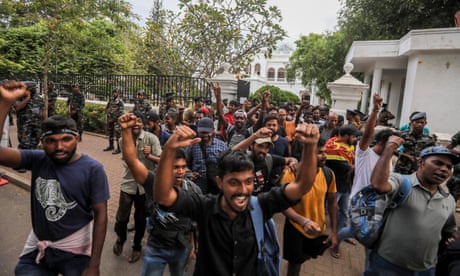- by foxnews
- 08 Apr 2025
Sri Lanka’s president quits after fleeing protests in crisis-hit country
Sri Lanka’s president quits after fleeing protests in crisis-hit country
- by theguardian
- 15 Jul 2022
- in news

Gotabaya Rajapaksa has resigned as president of Sri Lanka a day after fleeing weeks of mass protests over the country's economic crisis.
Rajapaksa's office said his resignation letter had been received by the country's parliamentary speaker, after it was flown from Singapore, to where the leader had fled via the Maldives.
The speaker's office said it would verify the authenticity of the letter, complete all legal processes and make an official announcement about Rajapaksa's resignation on Friday.
News of Rajapaksa's resignation was greeted by cheers and the lighting of firecrackers in the streets of Colombo. "I can't believe it, no more Gotabaya. This is a great day for the Sri Lankan people," said Rubika, 26, who was among those dancing in the streets as the news broke.
Rajapaksa left for the Maldives in the early hours of Wednesday, then went onwards to Singapore, leaving Sri Lanka in a state of political limbo as he refused to resign despite his absence.
Many people hold Rajapaksa responsible for driving Sri Lanka into its worst economic crisis since independence in 1948, which has led to severe shortages of fuel, food and medicines. Along with several members of his powerful family who held political posts, he is accused of economic mismanagement and widespread corruption.
Rajapaksa has not directly addressed the people of Sri Lanka since he was evacuated from his home on Saturday morning beforehundreds of thousands of people gathered in Colombo to demand he step down.
Rajapaksa's resignation was confirmed by Mohamed Nasheed, the former president of the Maldives, who helped facilitate the president's escape.
Rasheed tweeted: "President GR has resigned. I hope Sri Lanka can now move forward. I believe the president would not have resigned if he were still in Sri Lanka and fearful of losing his life."
Rajapaksa had pushed back against months of demands for him to step down, but he was forced into resigning after the protests on Saturday culminated in his presidential palace and offices being occupied by thousands of people.
He had originally given a date of 13 July for his resignation but it was delayed as he appeared to struggle to find a country that would provide a safe haven.
After his arrival on Thursday, the Singapore government made it clear Rajapaksa was not staying. In a swiftly released statement, the foreign ministry said Rajapaksa had been given entry to Singapore "on a private visit" and that "he has not asked for asylum and neither has he been granted any asylum".
A spokesperson for the Indian government denied reports that India had helped facilitate Rajapaksa's escape.
His final destination remains unclear. There are reports he will be travelling onwards to Saudi Arabia but they could not be confirmed.
Observers have said they assumed his resignation announcement would not come until he had reached a destination from where he could ensure protection from prosecution on charges of alleged corruption. He also faces longstanding war crimes accusations from his time as head of the armed forces during Sri Lanka's civil war.
Sri Lanka remained in a state of emergency and soldiers were authorised to use necessary force to prevent destruction of property and life, the country's army said in a statement on Thursday.
In Rajapaksa's absence, he had appointed the prime minister, Ranil Wickremesinghe, to be "acting president" with full executive powers. However this was rejected by protesters who have called for Wickremesinghe to resign over accusations he helped to prop up the Rajapaksa regime and protected the family for years.
On Wednesday, protesters forced their way through teargas and a thick wall of police and military enforcement to take over the offices of Wickremesinghe, demanding he resign immediately as prime minister and interim president.
According to the constitution, however, it is Wickremesinghe who will formally take the place of Rajapaksa. He could be sworn in as president on Friday, though would probably only occupy the role for a few days.
Parliament is due to reconvene in the coming days and power is expected to be handed over to a "unity government" comprised of multiple political parties, who will decide on a new prime minister. MPs will then vote for a president on 20 July.
On Thursday morning, protesters said they had peacefully handed back the government buildings they had occupied, including the president's residential palace, and the prime minister's offices and official residence, in order to maintain peace.
Swasthika Arulingam, a spokesperson for the people's movement known as Aragalaya, was damning of the actions recently taken by those leading the country. "For the last three days these politicians have acted as if this country is their private property," she said. "It is not their private property and they have put our country at risk, they have put our national security at risk."
She said protesters would occupy the president's administrative office to symbolise their continued call for systemic political change. The secretariat has been turned into a public library, where people have been encouraged to donate books. Some books claimed from the prime minister's official residence, Temple Trees, are among the collection.
- by foxnews
- descember 09, 2016
Ancient settlement reveals remains of 1,800-year-old dog, baffling experts: 'Preserved quite well'
Archaeologists have recently unearthed the remarkably well-preserved remains of a dog from ancient Rome, shedding light on the widespread practice of ritual sacrifice in antiquity.
read more


